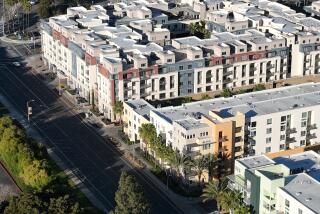Foreclosure activity soars in third quarter, ending lengthy lull
Banks fired up the California foreclosure machine in the third quarter, breaking out of a nearly yearlong lull that began in the midst of widespread revelations that banks were improperly seizing homes from delinquent borrowers.
A big August surge in foreclosure actions, led by Bank of America, sent the numbers up in the third quarter, according to DataQuick, a real estate information service in San Diego.
Notices of default, the first formal step in the foreclosure process, jumped 25.9% over the second quarter, when such filings had dropped to a three-year low.
News of the increase comes as talks have stalled over a broad foreclosure settlement by state attorneys general with the nation’s five largest mortgage servicers. California recently stepped out of those discussions, saying it would pursue its own path.
State and federal officials are trying to lure the state back into talks, floating an idea for helping creditworthy homeowners refinance loans that are underwater, or higher than the values of their homes.
Activists and consumer advocates criticized the recent default-notice increase as a move in the wrong direction. They have been protesting foreclosures and urging bank and government officials to take further steps to stem the tide of home seizures.
“Everyone in the economy is being hurt because the banks, the administration and Congress are not doing anything about the foreclosure crisis,” said Richard Hopson, chairman of the Alliance of Californians for Community Empowerment, which has led several protests in Los Angeles against banks in recent weeks. “Unless there is a resolution to that, there are going to continue to be problems with the economy.”
Kevin Stein, associate director of the California Reinvestment Coalition, an advocacy group in San Francisco, said foreclosures would probably only get worse unless banks and government officials took action soon.
“A lot of people are suffering, and the policies that we need are not in place,” Stein said.
An estimated 71,275 notices of default were filed against California properties during the three months that ended Sept. 30, with some properties receiving multiple notices because they had more than one loan, according to DataQuick. That was down 14.4% from the same quarter last year.
The majority of those loans were made during the peak bubble years of 2005 through 2007, when lending practices were at their loosest, DataQuick said.
New default actions against troubled borrowers slowed after the eruption of the so-called robo-signing scandal, in which banks last year were revealed to have used faulty paperwork and practices to take back homes. Experts say a backlog of distressed properties built up because of the numerous investigations into foreclosure and mortgage-servicing practices.
Besides California Atty. Gen. Kamala Harris, the attorneys general of New York, Delaware, Nevada, Massachusetts, Kentucky and Minnesota have signaled that they were unhappy with the direction of negotiations because, they say, the legal release from liability being offered to banks is too broad. New York and Delaware have been cooperating in their own probes separate from the coalition.
A spokesman for Harris said her office had not been presented with the latest plan aimed at enticing California back to the negotiations.
Mortgages were less likely to go into default in counties such as Marin, San Francisco and San Mateo and highly likely in Sacramento, Madera and Stanislaus, according to DataQuick. ZIP Code by ZIP Code, neighborhoods that have long been ravaged by the foreclosure crisis had the highest rates of people falling into foreclosure.
Neighborhoods in the inland towns of Lake Elsinore and Palmdale in Southern California and Tracy, Rancho Cordova and Antioch in Northern California were among the 10 areas with the highest rates of notices of default in the state, DataQuick said.
Sheri L. Stuart, spokeswoman for Springboard, a nonprofit community counseling center in Riverside, said counselors have seen an unrelenting stream of troubled borrowers seeking help in recent months.
“Unemployment is a major reason. Particularly in this region, the Inland Empire, unemployment has been trending higher,” she said. “People are struggling to keep their homes.”
Bruce Norris, president of Norris Group, an investment company in Riverside that buys foreclosed homes, said the repossessions are “unfortunately, unrealistically small” when compared with what banks need to do to keep up with the number of homeowners falling behind on their mortgages.
“It is just going to take a very long time to hit a firm bottom and to go up for real,” Norris said. “You have so many people who are not making their payments.”
California homeowners were a median eight months late on their mortgages when they received a notice of default during the third quarter, DataQuick said. On average, loans took about 10 months to move through the entire foreclosure process.
Defaults hit lower-cost neighborhoods harder. Areas with a median home sale price below $200,000 saw 11 default notices filed for each 1,000 homes, compared with 8.1 per 1,000 homes statewide and 2.8 per 1,000 homes in areas with a median sale price above $800,000.
Although more California homes entered the foreclosure process in the third quarter, the number of homes taken back by banks continued to decline, according to DataQuick. The number of filed trustee’s deeds — the papers that record the repossession of a home — declined 8.4% from the second quarter and 14.3% from the third quarter of 2010. A total of 38,895 trustee’s deeds were filed in the third quarter.
Separate third-quarter data released this month by RealtyTrac in Irvine showed that the number of homes entering foreclosure surged in states where repossessions take place largely outside of the courtroom, including California, Nevada, Arizona, Oregon and Washington.
Experts had said that these Western states would experience a foreclosure surge first because it is easier to get the process rolling again there.
Times staff writer Jim Puzzanghera in Washington contributed to this report.
More to Read
Sign up for Essential California
The most important California stories and recommendations in your inbox every morning.
You may occasionally receive promotional content from the Los Angeles Times.










